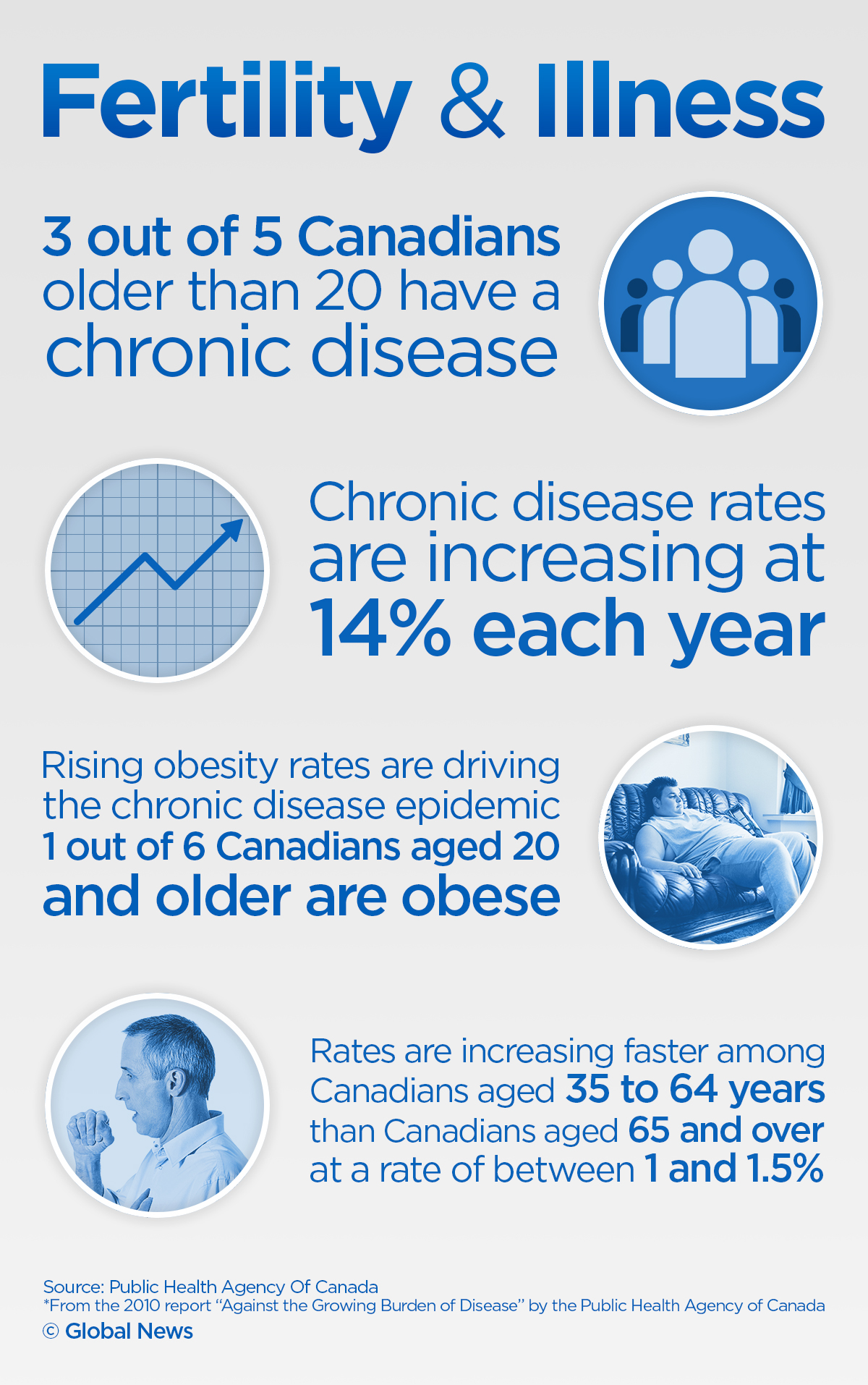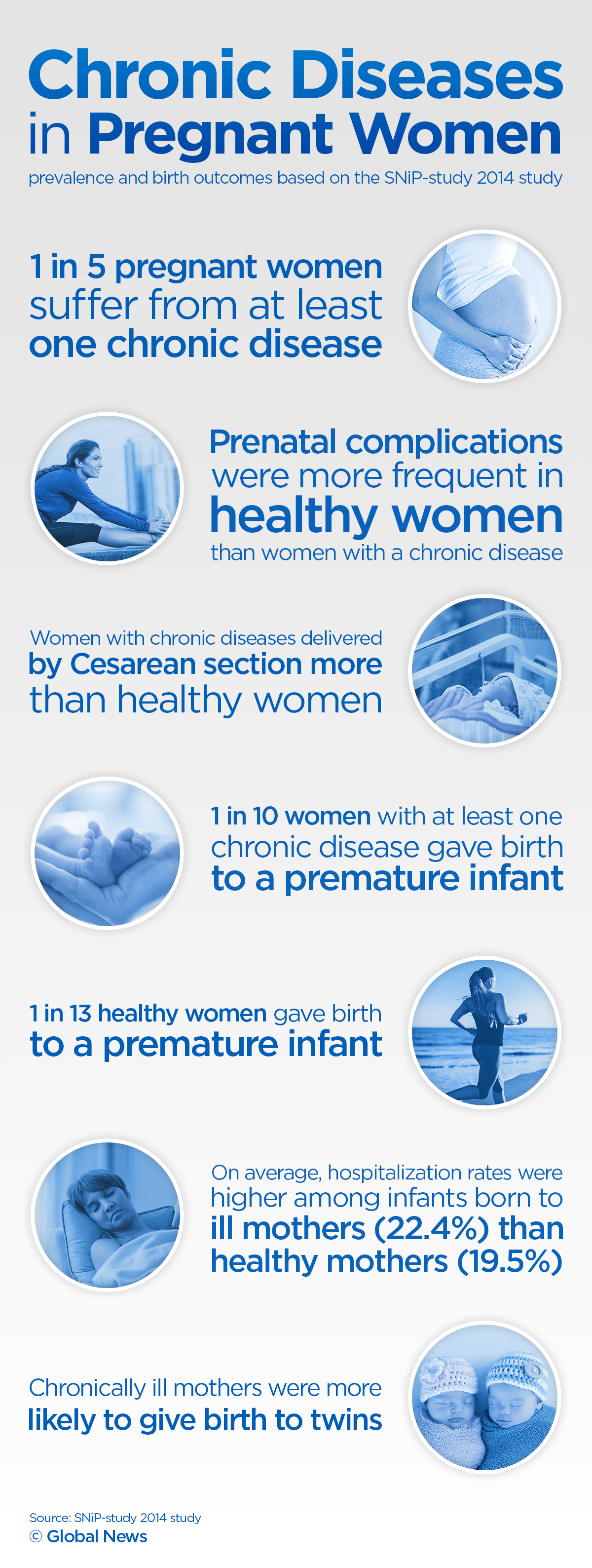This is the latest article in a Global News investigation into fertility in Canada, and the emotional and financial impact infertility has on Canadians struggling to conceive.

***
Conceiving can be difficult and complicated for some healthy women – add a chronic illness to the mix and the chances of getting pregnant may become smaller.
According to McMaster University, about one in five pregnant women suffer from at least one chronic disease and are more likely to have their pregnancies (if they can get pregnant) deemed high-risk by their physicians. These researchers also admit their stats may not capture every complicated fertility case out there.
What’s more, Public Health Agency of Canada has found the rates of chronic illness in women (and men) are increasing rapidly – at about 14 per cent each year. As it stands now, three out of five Canadians older than 20 years of age have a chronic disease.
So when it comes to chronically ill women wanting to conceive now – and in the future – hospitals around the world have had to adopt new practices and partnerships to help them through their pregnancies and possible fertility issues.
Dr. Darine El-Chaar is a maternal fetal medicine specialist at the department of obstetrics and gynecology at The Ottawa Hospital. One of her areas of expertise is helping women with chronic diseases navigate the process of having children.
According to El-Chaar, she treats more women in this scenario than many people may think.
“I’m a high-risk pregnancy physician and we do see a lot of these women,” she says. “We work with our partners in fertility and we often see the patients before they get pregnant. We do pre-conception counselling where we look at their medications, current condition and the progression of their disease.”
During these meetings, El-Chaar says she is able to give women a sense of what they can expect with their pregnancy based on previous studies and other’s experiences.
Some of the common types of chronic illnesses she sees are lupus, diabetes and rheumatoid arthritis, among others.
But just because a woman is living with an illness, it doesn’t always mean she’ll experience infertility, a difficult pregnancy or be deemed high risk, says El-Chaar. In fact, for some, pregnancy could be a blessing in disguise.
Keeping a watchful eye
(It’s important to note that every patient’s situation is unique and patients should consult their physician for individual medical advice.)
Women living with chronic illness will often have their pregnancies deemed high risk. Sometimes that may mean physicians will take additional precautions when monitoring the pregnancy so both mom and baby come out healthy.
Some of those conditions in which El-Chaar keeps a close eye on include lupus, diabetes, and certain kidney and cardiovascular diseases (among others).

Get weekly health news
Women with cystic fibrosis are also watched closely.
“We’re seeing a lot more women with cystic fibrosis,” El-Chaar says. “They have blocked tubes so that’s what’s causing their lungs to be more of an issue so they have a lot of fertility issues. In these cases, a lot of these women need IVF because the tubes are closed so they can’t really conceive but it’s not completely impossible for them to get pregnant on their own.”
In terms of cancer, doctors will take the type of cancer the patient has (estrogen based versus non-estrogen based) into consideration.
According to El-Chaar, estrogen based cancers are sometimes discovered during pregnancy (like breast cancer). When this happens, El-Chaar says physicians will have a thorough discussion with the patient and come up with a detailed plan of action.
Depending on where the woman is at with her pregnancy, they may choose not to go through with the pregnancy and instead focus on treating the disease.
But there are other options, El-Chaar says.
Doctors have been able to determine that chemotherapy can still be given as a treatment during pregnancy – the trick is timing and the type of chemo agent being used.
“Sometimes the chemotherapy agents a patient has received could affect their cardiac action for example,” El-Chaar says. “I’ll watch them a little closer and do more imaging and testing of their heart.”
Pregnant patients can be given certain types of chemo after 12 weeks and be treated up to a certain point – sometimes up to 30 weeks El-Chaar says. This may cause babies to be born prematurely but otherwise healthy.
According to BabyCenter, other conditions that cause weight loss – like thyroid disorders – may interfere with ovulation and affect fertility, as well as chronic liver disease as it impedes with the functioning of the pituitary gland.
The upside
With certain diseases – like multiple sclerosis (MS), rheumatoid arthritis and psoriasis for example – fertility is not often impacted and pregnancy can actually help relieve some symptoms associated with the disease.
Very similar to arthritis is psoriasis, says El-Chaar. (While many women report an improvement in their psoriasis, some experience a worsening, the National Psoriasis Foundation says.)
For patients with MS, many often experience fewer relapses in the disease over the nine months of pregnancy, according to the National Multiple Sclerosis Society.
(MS is a disease that affects the central nervous system, including the brain and spinal cord. It attacks myelin – the protective coating around the nerves – which causes inflammation and damages the myelin and nerve fibres, according to the MS Society of Canada.)
This clearing of symptoms, El-Chaar says, may be due to the role hormones (like progesterone and estrogen) play in the disease.
But because some of the medication MS patients take may be harmful to the fetus, women are often advised to stop taking them at least one full cycle prior to conceiving.
Unfortunately, there is a downside to this upside for women with these types of chronic illnesses, El-Chaar says.
What you need to know
Thanks to medical advancements over the years, women with chronic illnesses are rarely advised against conceiving, McMaster University researchers say.
However, there is a higher potential for women with certain types of diseases to experience miscarriages.
(According to Mayo Clinic, antiphsopholipid syndrome happens when the immune system mistakenly attacks normal protein in the blood. This can cause blood clots within the arteries or veins and can cause pregnancy complications like miscarriages and stillbirths.)
El-Chaar also says some types of cardiovascular diseases may experience more miscarriages due to the added stress inflicted upon the heart.
Despite chronic illness, El-Chaar wants women to know that a healthy conception, pregnancy and delivery is possible with the proper medical support.
“Know your disease and be as healthy and stable as you can,” El-Chaar says. “The more optimized you are in your disease, the better the pregnancy and fetal outcome.”
Graphics by Neil Sangani












Comments
Want to discuss? Please read our Commenting Policy first.